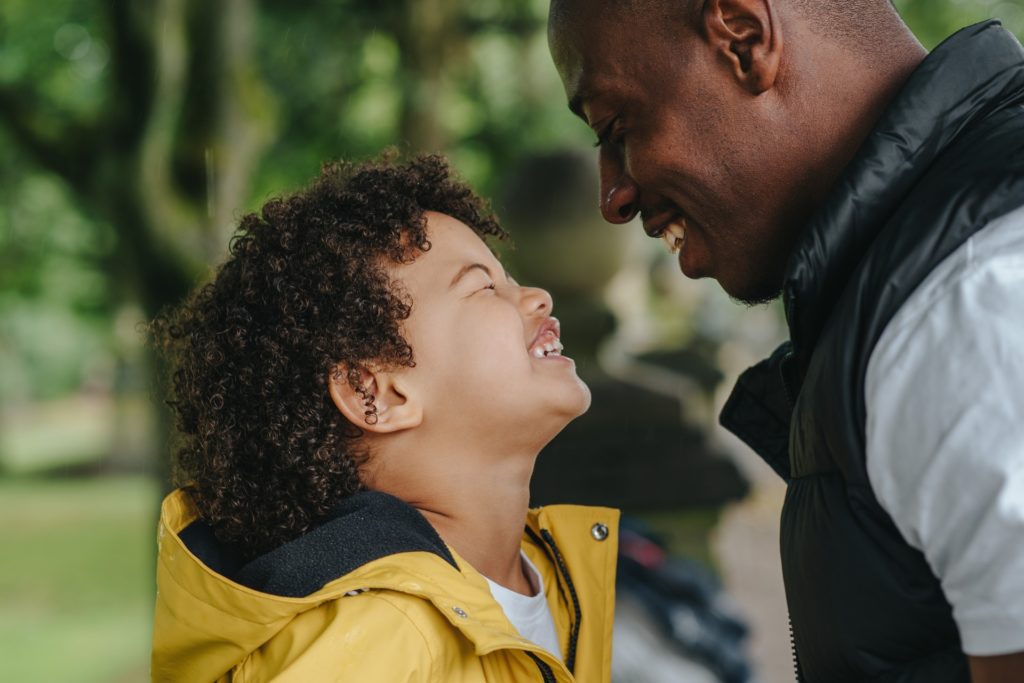Tips for the Embarrassed Parent of an Autistic Child

If you’ve ever found yourself embarrassed by something your autistic child has done in public, I understand.
As a neurotypical person, your brain is literally hard-wired to avoid being signaled out and “othered”. You’re a social creature who is designed to survive based on inclusion and relationships, and anything that threatens that, even your own child, can stir up primal feelings of self-protectiveness.
Here’s the problem with that, though: This is how proponents of behavior modification can so easily convince you that your child’s behavior needs to change or else. It’s how they can get into your head and convince you that anything, even emotional abuse, is preferable to embracing your child’s natural autistic traits.

They use your fear against you, which can keep you from listening to your parental instincts even if you know, deep in your heart, that your child is suffering from someone actively trying to change them.
Here are some tips to overcome your embarrassment and embrace your child’s differences:
- Realize you’re safe.
Back when we all lived in caves, we needed to feel, think, and act like everybody else around us so they wouldn’t see us as a threat and leave us alone to be eaten by a sabertooth cat.
Also, if you were bullied as a child or scolded by your parents for doing or acting “different” from others (which many children do in certain stages of life, whether they are neurotypical or neurodivergent), you may have developed a subconscious and internalized phobia of anyone behaving differently, including yourself or your child.
But, guess what? You’re a grown adult now who can make your own decisions! If someone has a problem with it, screw them! If you are someone who is used to conforming to societal expectations, this type of mentality may take a while to even consider, let alone master, but it’s worth it.
Also, you don’t need everyone in the community to accept you to avoid being thrown to the proverbial sabertooth cat. If you’re living an independent life and are responsible for your own finances and living situation, nobody has a right to dictate how you raise your child.
Even if you ARE financially or otherwise dependent on others (you live with your in-laws, you’re in between jobs, you’re a young parent, etc.), you still shouldn’t be bullied or manipulated into ‘towing the line’.
After all, this is YOUR child and YOUR life as a human being, which means you are more than within your rights to follow your own intuition and instincts when it comes to raising your little one.
You’re safe. Even if people around you are still trying to control your actions and behavior, you’re the parent, you’re the adult, and you are safe.
(If you’re truly not safe, and you’re being abused or mistreated, you need to make it a priority to get out of the situation as soon as possible, or your child will continue to suffer for it.)
- Practice mindfulness.
I watched a video on TikTok where a mother described how her young son, not yet diagnosed, but suspected to be autistic, was blissfully and happily stimming loudly in a grocery store when another shopper rudely told her that she should “control her child”.
Even a parent who is very in tune with their child can be made to second-guess their instincts when others respond to their child’s natural autistic traits with this type of attitude.
It can be very emotionally wearing, and, for some parents, this type of admonishment from strangers may induce embarrassment that may translate to yelling at or punishing their autistic child for natural traits that are not harmful to anyone.
The next time your child does something you find yourself inwardly cringing at, get curious about your feelings, and ask yourself why. What are the emotions behind that reflexive desire to shush him or pick her up and walk out of the store?
Are you afraid someone will judge you as a parent? Are you concerned your child will be bullied as they grow up? Are you feeling angry with yourself because your child’s behavior is ‘bothersome’ to others? Do you feel uncomfortable being the center of attention?
No matter what feelings you have, they’re valid. Be gentle with yourself. You’re human, and you have permission to feel however you feel.
Checking in with yourself can help you figure out where those impulses to shush, yell at, correct, scold, or run out of the store come from. Then ask yourself, “Can I live with this feeling of discomfort for the sake of my child’s mental health?”
I believe you’ll discover you can.

- Use neurotypical social standards to your advantage.
In neurotypical society, it’s common for people to look to each other to see how to respond in any given situation. This gives you a type of power you may never have realized you have.
The next time your autistic child does something that draws unwanted attention to you both (but is not harmful to either of you–such as humming, clapping, flapping, squeaking, etc.), consciously relax your tensing muscles, take a deep breath, and don’t react.
Resist the urge to look around wide-eyed to see if others are noticing, as this actually encourages unwanted attention and judgment.
Instead, smile and just keep going about your business. If you act like what your child is doing is OK, others will be more likely to do the same. Instead of letting the looks and judgment of others dictate your response, look to your little one to see when they need a time-out.
If someone dares to tell you to ‘control your child’ just look at them and smile, and say something like, “This is what she does when she’s happy!” Then, just let the statement hang in the air while holding the other person’s gaze.
Chances are, they’ll get uncomfortable and leave you both alone!
- Practice radical acceptance.
Radical acceptance is unconditional love in action. It is a way of looking at yourself and others with curiosity instead of judgment, seeking to understand rather than to change.
It’s the complete and wholehearted embracing of one’s strengths, weaknesses, quirks, bad habits, healthy behaviors, unhealthy behaviors, addictions, mistakes, failures, and victories all in one.
The way I came to understand radical acceptance was through a combination of a very open-minded church I’m fond of and dialectical behavior therapy (DBT).
This doesn’t mean that you don’t strive to be a better version of yourself if that’s what you want, it simply means meeting yourself where you’re at right now and being fully OK with it.
Practicing radical acceptance with yourself will help you feel much more comfortable around what some would view as “strange” or “quirky” behavior from your autistic child.
The more you love yourself, the more you’ll understand and be patient with your little one.

- Explain your thoughts, feelings, and reactions to your child lovingly and mindfully.
Once you’ve realized you’re safe, started practicing mindfulness, understood you can use neurotypical social conventions to your advantage, and practiced radical acceptance of both yourself and your child, you may still feel as though correcting your child’s behavior is something that would benefit them in the long run.
It’s understandable to want to give them the option of fitting in more effectively with their neurotypical counterparts.
But, it should be understood and taught as an option. This empowers your child to learn neurotypical social skills and conventions and act upon them if they choose to.
Personally, I compromise willingly, but I’m not a very good example because I’m a high masker with low support needs who was diagnosed at 35, so I have decades of trauma and internalized ableism to still unravel myself.
However, I’m glad I’ve learned more about neurotypical social conventions so I can act as an effective translator between the neurotypes and also avoid accidentally offending neurotypical friends and acquaintances.
I believe the best approach to teaching neurotypical social skills is to explain them in detail and answer any and all questions your autistic child puts to you. You’re teaching them another language, and it must be ultimately up to them whether they want to learn it.
Here’s an example of how I would teach it:
Let’s say you’re trying to explain to your child that being blunt can hurt someone’s feelings.
- Start with telling your young one what they did.
Always start with what instead of why because autistic intentions are different from neurotypical intentions, which means we might not even realize we’ve done anything that would be deemed inappropriate or out of the ordinary, and somebody suddenly yelling at us is confusing and traumatic.
So, for the blunt example, something like, “When Aunt Bea asked you if you liked her new dress and you said ‘no’, you hurt her feelings. Now, you were being honest, and that’s a great quality to have. Also, Aunt Bea asked a question and you answered it honestly and literally, and I understand that. But there’s something you need to know about people with neurotypical brains: They don’t always ask questions to get literal answers. Sometimes, they ask questions, especially about their appearance, to get validation. This means they’re actually looking for a compliment or for someone else to agree with their choice.”
Yes, you’re going to have to call yourself out (this is where the radical acceptance comes in handy), but you’ll be explaining it in a way that’s more understandable to your autistic loved one.
After all, the practice of asking questions for any other reason other than to get an honest answer is a foreign concept to us, and it has to be explained.
- Explain why what they’ve said or done is considered inappropriate.
The second step is to explain why something is considered inappropriate. “When you told Aunt Bea you didn’t like her new dress, she felt as though you were insulting her as a person. Neurotypical people often attach deep emotional value to the clothes they wear, the food they cook, the car they drive, the hobbies they enjoy, etc., so when you tell them you don’t like those things (even if they ask), it’s as though you’re saying you don’t like THEM.”
Be prepared for the baffled and incredulous looks. This mentality is REALLY confusing to us!
- Explain what would be more appropriate to do instead.
Follow up your explanations with suggestions on what answers would be more socially acceptable. “The next time someone asks you if you like their clothes, their cooking, etc., translate that into them asking if you like them as a person, and then answer accordingly.”
Warning, this could backfire if your autistic loved one actually dislikes the person because, guess what? We will answer honestly! It’s not because we want to be rude or we don’t care, it’s because being dishonest actually causes serious psychological distress to many autistic people.
Again, for many autistic people, neurotypical behavior and social customs are confusing and seem to contradict each other. This is why it’s so important to keep in mind that behaviors you might see as “embarrassing” are as natural to us as breathing, and the reactions we get from others to these behaviors are what confuse and traumatize us the most.
In other words, they may cause you a bit of discomfort or elicit a few odd looks from strangers, but if you try to stifle those behaviors out of embarrassment or a misguided desire to protect your child from future harassment, you will inadvertently cause them psychological harm, and, as a loving parent, I know that’s the last thing you want.
The world may misunderstand and mistreat them at times, but you are there to understand, love, nurture, guide, and protect.
You are your child’s safe space, and a safe space has no room for embarrassment.




Dear Jaime, I hope you don’t mind my corrections of your science mistakes, but it is a VERY autistic thing to do. I do mean this in a spirit of good humour and solidarity, and I mean no offence at all (i.e. your article about autistics communicating facts ALL the time). However, (here it comes), your first sentence is just all wrong.
“Back when we all lived in caves, we needed to feel, think and act like everybody else around us so they wouldn’t see us as a threat and leve us alone to be eaten by a sabertooth cat.”
Ok, first of all, it is very likely that autism was an adaptation that was extremely common when we were hunter/gatherers. Our heightened sensory perceptions, ability to process complex situations, and focus on multiple things at the same time were positively helpful for when we lived in caves. Also, in small cultural groups, autism is welcomed and even celebrated as a special competence. Second, we never lived in caves. Finally, no human was ever eaten by a sabre tooth cat (thank you for not calling it a “sabre tooth tiger”). ; )
“Our heightened sensory perceptions, ability to process complex situations, and focus on multiple things at the same time were positively helpful for when we lived in caves. Second, we never lived in caves.” This is confusing me. Are you saying we lived in caves or we did not live in caves? Also, I’m not sure why you think no saber-tooth cat has never eaten a human because they lived in the same time period, and there is evidence to suggest that they may have dined on us. I do agree with you about autism being an evolutionary survival skill, but I’m not sure I understand your meaning or intention on the rest.
While it is true that up until the last glacier age, the MAJORITY of humans did not reside in caves, there is scientific evidence and remains of cave communties from that time period, for example, Mount Carmel in Israel.
And yes, I concur with Jaime, there is indeed evidence to suggest the possibility of a saber tooth cat perhaps injesting humans at some point in time. However, since I was not there and have not researched it thoroughly, I acknowledge that I don’t know for sure.